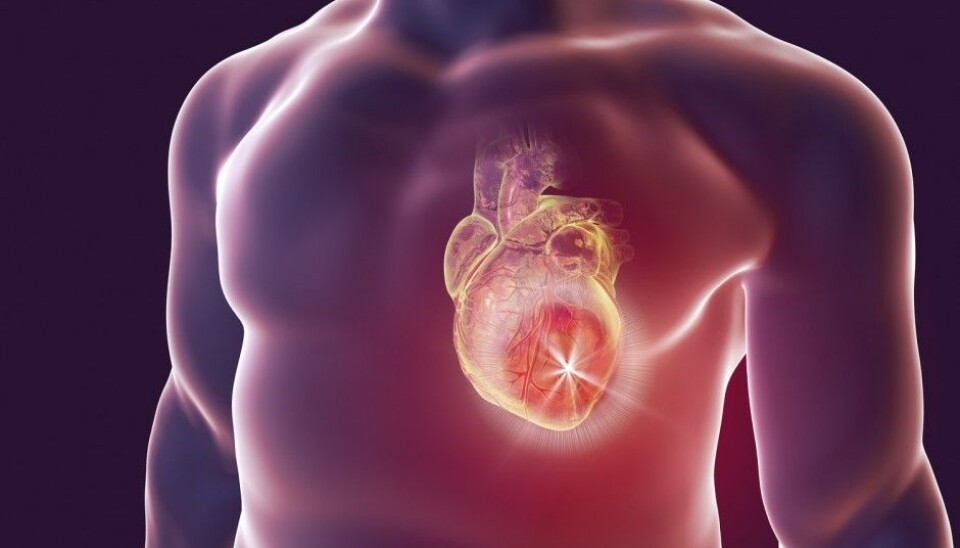
Those who feel their own heartbeats are more generous
A new study shows an association between kind-heartedness and detecting one’s own heartbeats.
Researchers from Stockholm University and Anglia Ruskin University in the UK have joined forces in a new study to determine why some people are more generous than others.
Oddly, the researchers found a connection between the ability to perceive one’s own heartbeat and altruism. Expressions like being “kind-hearted” can be seen in a new light, as people who are more in touch with their hearts were found to be more generous than others.
What forms our emotions?
The researchers wished to take a closer look at interoception, the perception of internal organs — including the heart — to see whether there was a link between this awareness and our emotions and choices. How well do we feel and interpret various body signals? Many think of body reactions, for instance a quicker pulse, as a result of our feelings. But this could be a two-way street. Maybe the body sends signals to the brain and that impacts our feelings.
“More and more evidence shows that inner body conditions have an effect on emotional experience and that increased interoception is associated with having more intense emotions,” write the researchers, referring to other studies.
“The relationship between the body’s and the brain’s signals is involved in creating emotions, but how this occurs is a matter of discussion.”
“One influential theory points to the importance of body signals to what we feel. We think that people who are better at perceiving their own heartbeats are also better at perceiving other people’s feelings,” writes Jonas Olofsson from Stockholm University to ScienceNordic’s Norwegian partner forskning.no. Olofsson is one of the researchers behind the study.
Giving away money
The study was conducted with 30 persons. First they were put to a test which assessed their generosity, known as the dictator game. Participants were given real money and asked to split it up between themselves and a person they had never seen before. The more they gave away the less they received themselves for participating in the test.
Then their heartbeats were measured with an ECG. They listened to various sounds and were asked whether the rhythms were in sync with their own heartbeats, without being allowed to physically check their own pulses.
The participants’ abilities to were seen to vary widely, but those who were better at sensing their own heart rates were also those who were most altruistic in the money game.
“Our participants in Sweden and England gave away on average more than a third of the money issued to them, seemingly without thinking much about it. But those who were best at feeling their own heartbeats distributed the most,” says Olofsson.
Jane Aspell from Anglia Ruskin University wonders whether this could have something to do with the heart sending out signals that impact our feelings.
“It may be that an emotionally-charged situation — such as deciding whether or not to give money away — causes a change in heartbeat. This bodily change may then bias decision making towards the generous option in those people who are better at detecting their heartbeats,” said Jane Aspell in a press release.
No connection the other way
In the next phase, the researchers tried to train participants to detect their own heartbeats. Then the dictator game was played again, but no link was found between a trained sensitivity to pulse and being more generous. This could either mean that the association between interoception and generosity is about something else, or that the training was simply not sufficiently successful.
“This indicates that the interaction between generosity and body signals is complicated and that this needs to be researched more. Maybe altruistic people have incorporated this in their daily behaviour throughout their lives? This is not an ability that is promptly acquired,” said Olofsson.
More knowledge needed
If the findings from the first test are solid this might explain why Buddhists swear by frequent meditation as a method of becoming or remaining less egotistical. One common form of meditation involves focusing on one’s own breathing.
“Meditation can make us more aware of our own feelings and reactions, but social activities and interactions with others are required to become better people,” says Olofsson.
However, being more attentive to our internal organs is not always beneficial. Another experiment has shown that persons with obsessive compulsive disorder (OCD) and panic attacks overmonitor their own heartbeats. Medical science is still in the dark about many of the ways in which emotions and the body interact.
“Our results showed an association between sensitivity to heartbeats and generosity, but more research is needed to understand why this relationship exists,” says fellow researcher Jane Aspell.
-------------------------------------
Read the Norwegian version of this article at forskning.no
Translated by: Glenn Ostling





